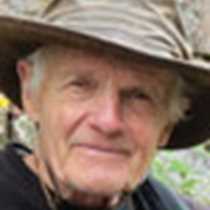Pavlof Harbor and Chatham Strait, Alaska
We awoke to yet another day of sparkling sea and blue sky; is this really the temperate RAIN forest? After a hearty breakfast we broke into groups, some to kayak around our anchorage in Pavlof Bay, others to set off on a 3 and a half hour walk around Lake Pavlof. Even before we left for shore a brown bear and two small cubs were spotted near the river mouth and not far away, two Sitka deer sported their warm brown pelage.
Once ashore the long hikers started for the lake, followed by those interested in a shorter hike. Pink salmon flip flopped in the shallows near the estuary. Others lay partly eaten by the side of the river. Eventually the trail deteriorated at times into bush bashing, mud wallowing and creek jumping. We reminded ourselves that we were on a Lindblad Expedition, not a Tour! Any slight discomfort was more than amply rewarded by the stunning views around the mountain shrouded lake, a good view on the far shore of a sow brown bear and two small cubs, a bear marked tree fuzzy with brown bear hair, and an enchanting mossy forest never touched by the hand of man. In the meantime the kayakers were able to kayak very closely to an unconcerned mother bear and cubs, a thrill of a lifetime.
In case the morning did not have enough highlights, the afternoon will never be forgotten. We began with a delicious barbeque in the warm sun on the back deck. Then we watched seven humpback whales bubble-net feeding around the ship for two hours. Time after time the whales made their circle of bubbles to trap their krill prey then together they lunged skyward enormous mouths agape to engulf tons of water rich with their food. To top off the experience we had Pieter Folkens of the Alaska Whale Foundation describing the behavior of the whales. A hydrophone hung over the ship’s side broadcasted to all of us what the whales were saying to one another: an eerie cry a half a minute before the whales exploded into the sky warned us to be alert for one of the great wildlife spectacles on Planet Earth.
We awoke to yet another day of sparkling sea and blue sky; is this really the temperate RAIN forest? After a hearty breakfast we broke into groups, some to kayak around our anchorage in Pavlof Bay, others to set off on a 3 and a half hour walk around Lake Pavlof. Even before we left for shore a brown bear and two small cubs were spotted near the river mouth and not far away, two Sitka deer sported their warm brown pelage.
Once ashore the long hikers started for the lake, followed by those interested in a shorter hike. Pink salmon flip flopped in the shallows near the estuary. Others lay partly eaten by the side of the river. Eventually the trail deteriorated at times into bush bashing, mud wallowing and creek jumping. We reminded ourselves that we were on a Lindblad Expedition, not a Tour! Any slight discomfort was more than amply rewarded by the stunning views around the mountain shrouded lake, a good view on the far shore of a sow brown bear and two small cubs, a bear marked tree fuzzy with brown bear hair, and an enchanting mossy forest never touched by the hand of man. In the meantime the kayakers were able to kayak very closely to an unconcerned mother bear and cubs, a thrill of a lifetime.
In case the morning did not have enough highlights, the afternoon will never be forgotten. We began with a delicious barbeque in the warm sun on the back deck. Then we watched seven humpback whales bubble-net feeding around the ship for two hours. Time after time the whales made their circle of bubbles to trap their krill prey then together they lunged skyward enormous mouths agape to engulf tons of water rich with their food. To top off the experience we had Pieter Folkens of the Alaska Whale Foundation describing the behavior of the whales. A hydrophone hung over the ship’s side broadcasted to all of us what the whales were saying to one another: an eerie cry a half a minute before the whales exploded into the sky warned us to be alert for one of the great wildlife spectacles on Planet Earth.




